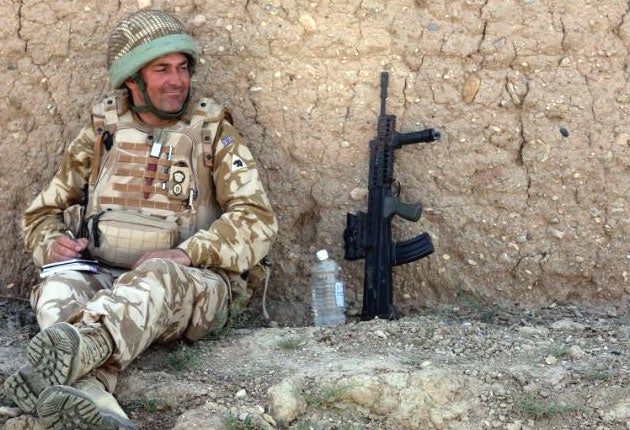Army loses highest-ranking officer since Falklands War
Roadside bomb kills soldier and his commanding officer in Afghanistan

The highest ranking officer in the British Army to be killed in combat since the Falklands War is among the latest fatalities in Afghanistan. Lieutenant-Colonel Rupert Thorneloe, the commanding officer of the 1st Battalion Welsh Guards, died in a roadside blast in Helmand which also killed another soldier and injured six.
Lt-Col Thorneloe was killed while engaged in a mission to clear Taliban positions 8km north of Lashkar Gar, the capital of Helmand. The operation, codenamed Panchai Palang (Pashtu for panther's claw), was in preparation for the launch of the long-expected "surge" of 4,000 US Marines ahead of the elections in August.
Lt-Col Thorneloe and Trooper Joshua Hammond, of 2nd Royal Tank Regiment, died after a Viking armoured vehicle was hit by a roadside bomb. Their deaths took the number of British service personnel killed in Afghanistan to 171, eight fewer than the total number of those killed in Iraq.
The last officer of equal seniority to die in action was Lieutenant-Colonel Herbert "H" Jones, who was killed at Goose Green in 1982. The commanding officer of 2nd Battalion The Parachute Regiment was posthumously awarded the Victoria Cross for his gallantry. He and his men had been ordered to attack dug-in positions and he was leading the charge from the front when he was shot. Until yesterday, only seven army commanding officers had died on operations in command of their units since 1948. A memorial at Sandhurst's Royal Memorial Chapel commemorates them.
Lt-Col Thorneloe was made an MBE during service in Iraq in 2006, when he held the rank of major. He had been deployed with the Welsh Guards around Lashkar Gar. The town, which had come under increasing attack from a resurgent Taliban, had experienced a number of suicide bombings. Nearby areas were being used to transport fighters, arms and opium to other parts of the province.
Lt-Col Thorneloe was directing his troops in an operation involving 500 British and Danish troops who were seeking to outflank Taliban positions around Babaji, beside the Helmand River, and Gereshk. The insurgents put up fierce resistance and American and Canadian helicopter gunships had to be called in to support the mission.
Lt Col Thorneloe's wife Sally said: "Rupert was my very best friend and his death is a devastating blow. Our daughters Hannah and Sophie will have to grow up without their beloved Daddy, although I will see a part of him in them every day."
Shortly before his death, Lt-Col Thorneloe said in an interview: "Our job is to give steady and visible assurance to the Afghan people. We are working alongside the ANA [Afghan National Army] and of course the main aim is to let the Afghans take full control of their affairs as soon as possible and without the threat of insurgent violence."
General Sir Richard Dannatt, the Chief of the General Staff, said last night: "The deaths of Lt-Col Rupert Thorneloe MBE and Tpr Joshua Hammond during Operation Panchai Palang in Helmand Province is a devastating blow to the Welsh Guards Battle Group and to the Army as a whole. Lt-Col Thorneloe was an outstanding commanding officer and a born leader, who I knew well.
"His courageous, thoughtful stewardship of 1st Battalion Welsh Guards since October last year has seen them superbly prepared for the demands of Afghanistan, both in terms of their professional capability and their unbreakable spirit as a team.
"At the leading edge of his generation, his loss will be felt deeply not only by his family but also by his soldiers and others, who like me, had the privilege to serve with him.
"Tpr Hammond was a first class tank crewman who epitomised the spirited and determined approach to operations expected of Royal Armoured Corps soldiers."
In a statement released by the MoD, his family, from Plymouth, said: "Joshua was a tremendous son. He was proud to be a soldier and died doing a job he loved."
Subscribe to Independent Premium to bookmark this article
Want to bookmark your favourite articles and stories to read or reference later? Start your Independent Premium subscription today.

Join our commenting forum
Join thought-provoking conversations, follow other Independent readers and see their replies